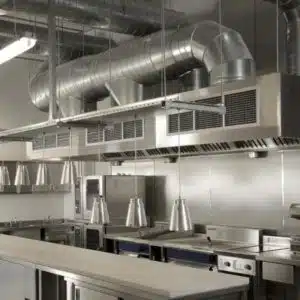29 Mar Kitchen Extraction Cleaning Health and Safety
For businesses operating in the food industry, maintaining a clean and safe kitchen is paramount. However, one aspect of kitchen safety often overlooked is kitchen extraction cleaning.
Importance of Kitchen Extraction Cleaning
Professional deep cleaning of kitchen extraction systems is critical to ensure the safety and efficiency of your kitchen.
Kitchen extraction cleaning refers to the regular cleaning and maintenance of the filters, ductwork, and ventilation systems that remove smoke, steam, grease and other airborne particles from a commercial kitchen. Without regular cleaning, these vents and ducts can accumulate large amounts of contaminants that can become a fire hazard when they build up.
Dirty ventilation systems cause an estimated 64% of all kitchen fires, so it’s vital that these systems are adequately cleaned by qualified professionals at least twice a year.
Health and Safety Risks
Dirty kitchen extraction systems can pose a severe health and safety risk to employees and customers. When the filters and ductwork are not cleaned regularly, mould, bacteria, and other allergens can accumulate.
These pollutants can have a negative impact on employee health, causing respiratory problems, allergies, and other health issues. Furthermore, if employees are exposed to these contaminants over an extended period, they may develop chronic health conditions requiring medical attention.
In addition to the impact on employee health, dirty kitchen extraction systems can also lead to foodborne illness. When contaminants from the ductwork and filters are released back into the kitchen, they can settle on surfaces and food, spreading harmful bacteria and pathogens.
Legal Requirements and Compliance
Businesses in the food industry are legally obligated to ensure that their kitchen extraction systems are cleaned and maintained regularly to ensure compliance with health and safety regulations. Failure to comply with these regulations can result in fines, legal action, and damage to a business’s reputation.
The Health and Safety at Work etc. Act 1974
Requires employers to provide a safe working environment for their employees. This includes ensuring that kitchen extraction systems are clean and well-maintained to prevent the spread of harmful contaminants.
Control of Substances Hazardous to Health (COSHH) regulations
These regulations require employers to identify, assess, and control the risks associated with hazardous substances, including those found in kitchen extraction systems.
Workplace (Health, Safety and Welfare) Regulations 1992
Requires employers to ensure adequate ventilation in the workplace. The HSE recommends mechanical extraction as the ideal way of achieving this. Therefore business owners must adequately maintain these systems to ensure they are working at their maximum efficiency.
Gas Safety (Installation and Use) Regulations 1998
States that certain kitchen appliances must be fitted with a flue, a duct that carries fumes and gases away from the appliance and workspace. These flues must be checked regularly to ensure they are working correctly, as failure to do so can lead to carbon monoxide poisoning.
TR19 – Kitchen Extract Cleaning Standards
The TR19 standards are the industry guidelines for kitchen extraction system cleaning and maintenance. These standards outline how often these systems should be inspected, tested, cleaned, and maintained to ensure compliance with local health and safety regulations.
To ensure compliance with these regulations, businesses should regularly inspect their kitchen extraction systems and keep detailed records of their cleaning and maintenance activities. It’s also important to hire a professional cleaning service with the expertise and equipment to clean the system thoroughly and safely.
Benefits of Professional Kitchen Extraction Cleaning Services
Hiring a professional kitchen extraction cleaning service offers several benefits to businesses in the food industry. Here are some of the key advantages:
- Professional equipment: Professional HVAC cleaning services use specialised equipment and techniques to ensure the system is thoroughly cleaned and maintained. This includes high-pressure cleaning systems, steam cleaning, and other tools unavailable to the average business owner.
- Expertise: Professional cleaners have the knowledge and experience to detect and address potential hazards before they become a problem. They are trained to identify areas of the system that may be more prone to grease buildup or other issues and can take proactive steps to prevent future problems.
- Compliance: Professional cleaners are up-to-date with the latest regulations and compliance standards for kitchen extraction cleaning and maintenance. By hiring a professional service, businesses can ensure that they meet legal requirements and avoid fines and legal action.
- Time-saving: Kitchen extraction cleaning can be time-consuming and labour-intensive, taking employees away from other essential tasks. By outsourcing the cleaning to a professional service, businesses can save time and focus on their core operations.
- Cost-effective: While it may seem like an added expense, hiring a professional cleaning service can actually save businesses money in the long run. Regular cleaning and maintenance can extend the system’s life, reducing the need for costly repairs or replacements.
Conclusion
Professional kitchen extraction cleaning can help businesses in the food industry to ensure compliance with local regulations, reduce safety risks, save time and money, and extend the life of their systems.
Companies can protect their employees, customers, and profits by hiring a professional service with the expertise and equipment to clean the system safely.
Contact us today to learn more about our professional kitchen extraction cleaning services and how we can help your business maintain a clean and safe kitchen.

